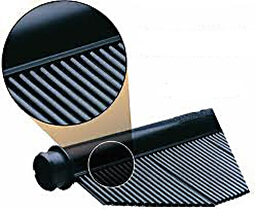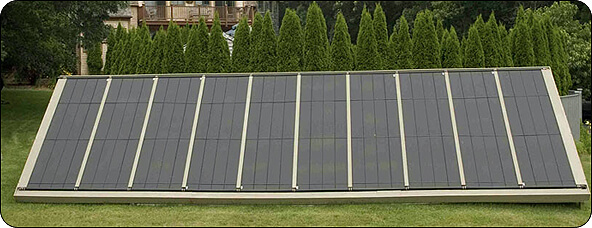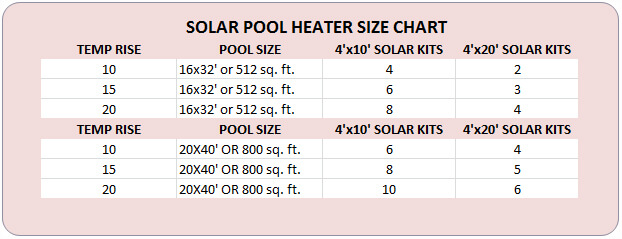FREE Standard Shipping On All Orders $100 or More!*
Supplement Gas Heat with Solar Heat
 Pool owners everywhere know just how expensive it is to heat a pool. There are a few things that can be done to reduce heating expenses without taking a hit on pool comfort. Tighten up your budget for the pool by saving heating costs with some eco-friendly solar pool heating.
Pool owners everywhere know just how expensive it is to heat a pool. There are a few things that can be done to reduce heating expenses without taking a hit on pool comfort. Tighten up your budget for the pool by saving heating costs with some eco-friendly solar pool heating.
If you currently use natural or propane gas to heat your inground pool, you know that it can cost $1000 per summer to heat your pool. Install a solar pool heater, and slash your annual pool heating costs by up to 75%!
HOW DOES SOLAR POOL HEATING WORK?
 For solar pool heaters, a flow control valve redirects the pool water through the solar panels. The design of the solar panel traps the heat of the sun, and transfers the heat to the pool water as it cycles through hundreds of tiny heat tubes.
For solar pool heaters, a flow control valve redirects the pool water through the solar panels. The design of the solar panel traps the heat of the sun, and transfers the heat to the pool water as it cycles through hundreds of tiny heat tubes.
When used with a solar controller (highly recommended), the control valve turns automatically, as directed by a thermostat and two sensors; panel temperature and water temperature sensors.
SELECTING A SOLAR POOL HEATER
Inground solar pool heaters with a solar controller and all supplies typically costs $1500-$2000; plus a day of your time to install the panels. You will see a quick payback in 2 to 4 years however, as you cut your gas heating bills in half without even trying!
Solar heater systems have a longer life than gas pool heaters, and are virtually maintenance free. And, as you use your gas pool heater less, it will need fewer repairs and also last longer!
Before you make the decision to buy a solar pool heater to supplement a gas pool heater, let's pre-qualify you as a candidate for solar pool heat.
- Roof, Rack or Fence with unobstructed sun of 6 hrs. per day.
- A southern orientation is best, although SE and SW work as well.
- Size matters - the more solar panels, the more heat is created.
 SIZING A SOLAR POOL HEATER
SIZING A SOLAR POOL HEATER
For inground pools, a good rule of thumb is to install 50% of your pool area in solar panels to achieve a 15 degree temperature rise. For example, a 16x32' pool has 512 sq. ft. of surface area (16x32=512), and should use at least 256 sq. ft. of solar panel surface area (512/2=256), for about 15° of heat.
Want more than 15° of heat? Install more solar panel square footage!  Other factors to consider include high winds across the pool, or cool nights in desert areas or high elevations. In these cases, using a solar blanket or an automatic pool cover will help retain the heat. Or, simply install more panels, and increase the 50% rule of thumb to 70% or so, to compensate.
Other factors to consider include high winds across the pool, or cool nights in desert areas or high elevations. In these cases, using a solar blanket or an automatic pool cover will help retain the heat. Or, simply install more panels, and increase the 50% rule of thumb to 70% or so, to compensate.
INSTALLING A SUPPLEMENTAL SOLAR HEATER
Installing a supplemental solar pool heater is no different that installing one where there is no gas pool heater. In a nutshell, you will install a 3-way valve on the return line after the gas heater, and run a pipe to the solar panels. A second pipe will carry water back from the solar panels, and connect into the return line. A one way check valve is used to prevent water cycling.
 It is cheaper and faster if you can locate the solar panels on a roof or rack directly overhead of the pool equipment, but if needed, you can run pipes to solar panels located elsewhere.
It is cheaper and faster if you can locate the solar panels on a roof or rack directly overhead of the pool equipment, but if needed, you can run pipes to solar panels located elsewhere.
IT JUST MAKES CENTS
 Solar pool heaters and gas pool heaters used together will have your pool comfortable all year around, without any discomfort about energy costs. With a dual heater system you'll only need the gas heater at the start and end of the season, and once or twice during summer cold snaps.
Solar pool heaters and gas pool heaters used together will have your pool comfortable all year around, without any discomfort about energy costs. With a dual heater system you'll only need the gas heater at the start and end of the season, and once or twice during summer cold snaps.
You may even decide to open the pool earlier and close the pool later, and keep the water luxuriously warm - once you see all the money you are saving!

Alex Malamos
InTheSwim Staff Blogger